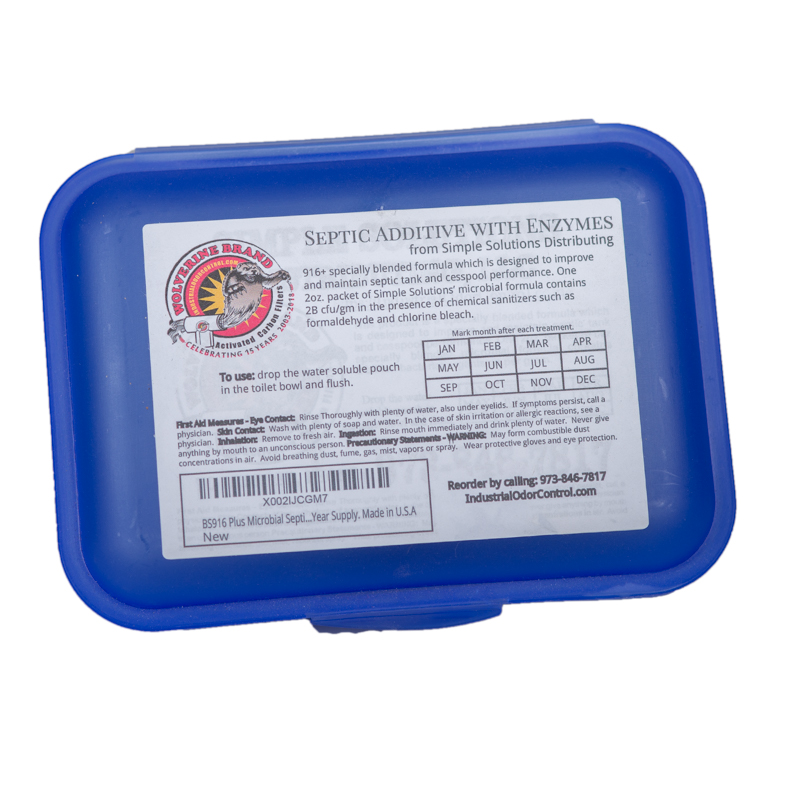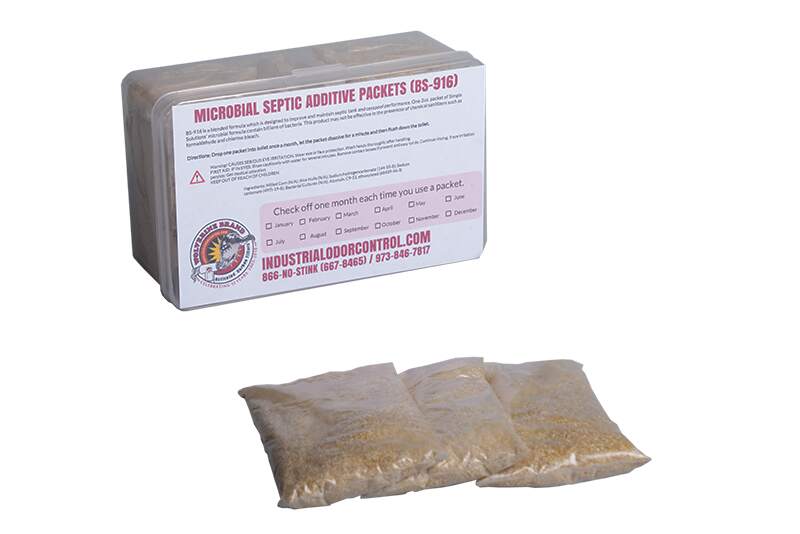Septic Odor Inside a House Versus Outside a House
We frequently recieve calls from home-owners who are experiencing a septic odor inside their house. Unfortunately the products that Industrial Odor Control makes are for odors on the outside that are eminating from vent pipes on your roof or in your yard. Today's blog will walk you through the possible sources of odor control both inside and outside your home.
If you have a septic system, you may have experienced the unpleasant smell of
septic odor at some point. Septic Systems naturally have a slight odor, however, a strong and persistent smell can be a sign of a problem. But what is the difference between septic
odor inside a house versus outside a house? We will explore the causes of septic odor and how to address them.
What Causes Septic Odor?
What causes septic odor? Septic odor is caused by the gasses produced during the breakdown of waste in your septic tank. Hydrogen sulfide and methane occur naturally and are usually released through the vent pipes on your roof.
Septic System Maintenance
One of the main causes of septic odor is a lack of proper maintenance. Regular maintenance of your septic system is crucial to prevent any issues that can lead to septic odor. This includes pumping your septic tank every 3-5 years, depending on the size of your household and the size of your tank.
If your septic tank is not pumped regularly, solid waste can build up and clog the pipes, causing a backup and releasing foul odors. It's also important to have your septic system inspected regularly. This will catch any potential problems before they become major issues.
Use a Septic Additive for a Healthy Septic Environment
Using a septic additive can help you to maintain the bacterial levels in your septic tank. This bacteria helps to break down individual elements and neutralize the gasses produced in your septic tank and eliminate the odor by helping to provide beneficial bacteria to your septic tank.
One of our products even has the added benefit of having enzymes, basically food for the beneficial bacteria.
 BS-916 Septic Additive with Enzymes $39.95 |  BS-916 Septic Additive $39.95 < |
Clogged or Damaged Vent Pipes
As mentioned earlier, the vent pipes on your roof are responsible for releasing the gases produced in your septic tank. If these pipes become clogged or damaged, the gases can escape into your home instead of being released outside.
Clogs can be caused by debris, such as leaves or animal nests, while damage can be caused by weather or physical damage. Regularly checking and cleaning your vent pipes can help prevent septic odor from entering your home.
Leaks in the Septic System
Leaks in your septic system can also cause septic odor inside and outside your home. These leaks can be caused by cracks in the tank or pipes, which can allow gases to escape into your yard or home.
If you notice a strong odor in your yard, it is important to have your septic system inspected to determine the source of the leak and address it promptly.
Septic Odor Inside a House
Now that we understand the causes of septic odor, let's explore the difference between septic odor inside and outside a house. Septic odor inside a house is sometimes a sign of a problem with your septic system. Other times it can be something more simple.
Backup in the Pipes
One of the most common causes of septic odor inside a house is a backup in the pipes. This can happen when the septic tank is full and needs to be pumped, or when there is a clog in the pipes.
If you notice a strong odor coming from your drains or toilets, it is important to have your septic system inspected and pumped if necessary.
Damaged or Loose Toilet Seal
Another common cause of septic odor inside a house is a damaged or loose toilet seal. The toilet seal is a wax ring that seals the connection between the toilet and the floor. If this seal is damaged or loose, it can allow septic odor to escape into your bathroom.
If you notice a strong odor coming from your toilet, it is important to have the seal replaced to prevent further issues.
Holes in Vent Pipes
It is not unheard of for a contractor to drive a nail into a pipe in a wall. This can also be a source of odor inside the house. The solution here is to bring in your plumber who may elect to smoke your pipes to find holes.
Dry P-Traps
Another way that odor can get into your home is if you haven't used a tub or sink in a while and the water in the p-trap has evaporated. That would then leave a point of entry for the odor into your house. To rule this out, make sure that all sinks and tubs have the water run occasionally to keep the p-trap from drying out.
Septic Odor Outside a House
Septic odor outside a house does not always indicate a problem with your septic system. That's not to say that you can rule it out without going through a series of steps to determine the source of the problem. Here are some common causes of septic odor outside a house.
Topographical Interference
Normally the gases coming from a roof vent would be carried away by the wind. If a house is up against a line of trees or a hill, this can create a wind vortices that pushes the odor down towards the ground. Your options include trying to extend the vent pipe above the roof line or adding one of our four residential Wolverine carbon air filters that Industrial Odor Control sells.
 Wolverine Cub Septic Vent Odor Filter $62.95 Buy Now |
 Wolverine HD Heavy-Duty Septic Vent Odor Filter $99.95 Buy Now |
 Wolverine Linear Roof Septic Vent Odor Filter $99.95 Buy Now |
 Wolverine Inline Septic Vent Odor $140.00 Buy Now |
Leaking Septic Tank
A leaking septic tank is a common cause of septic odor outside a house. If your septic tank is leaking, it can release foul odors into your yard, making it unpleasant to spend time outside.
If you notice a strong odor in your yard, it is important to have your septic system inspected to determine the source of the leak and address it promptly.
Clogged Drain Field
The drain field is responsible for filtering and dispersing the liquid waste from your septic tank into the soil. If the drain field becomes clogged, it can cause a backup in your septic system and release foul odors into your yard.
Regular maintenance and proper use of your septic system can help prevent clogs in the drain field.
Damaged or Clogged Vent Pipes
As mentioned earlier, damaged or clogged vent pipes can cause septic odor outside a house. If the gases produced in your septic tank cannot escape through the vent pipes, they can escape into your yard instead.
Regularly checking and cleaning your vent pipes can help prevent septic odor from entering your yard.
How to Address Septic Odor
If you are experiencing septic odor inside or outside your house, it is important to address the issue promptly. Here are some steps you can take to address septic odor.
Add a Wolverine Activated Carbon Filter
Industrial Odor Control offers four residential septic odor filters that can eliminate odor coming from vent pipes.Pump Your Septic Tank
If your septic tank is full and needs to be pumped, this could be the cause of septic odor inside or outside your house. Contact a professional septic service to have your tank pumped and inspected.
Repair Any Damage or Leaks
If your septic system has any damage or leaks, it is important to have them repaired as soon as possible. This will eliminate the odor and prevent further damage to your septic system.
Regular Maintenance
Regular maintenance of your septic system is crucial to prevent septic odor and other issues. Make sure to have your septic tank pumped every 3-5 years and have your system inspected regularly.
Conclusion
Understanding the difference between septic odor inside versus septic odor outside a house is important for addressing any issues with your septic system. By properly maintaining your septic system and addressing any problems promptly, you can prevent septic odor and keep your home and yard smelling fresh.
